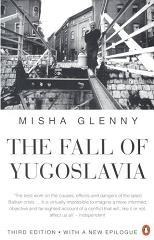
The Fall of Yugoslavia
Misha Glenny
314 pages, including index
published in 1996
The Fall of Yugoslavia was the first book I read in 2007, I got it as a Christmas present from Sandra. I had put this book on my Amazon UK wishlist quite a while back, after having read Glenny’s The Balkans 1804-1999, which was an impressive overview of the modern history of the Balkans. I thought it would be a good book to start the new year with and was not disappointed.
If there’s one thing I’ve learned the past few years blogging the War on Iraq it’s that you can follow the news on tv, read the newspaper reports and magazine coverage on a subject and think you know what’s going on, when in fact you’ve only gotten part of the facts, often arranged in a preconcieved narrative. Even if the news media are basically honest in their reporting, it is too immediate to see beyond the story being reported, to put them in context and digest them. At the same time, news thrives on new and unusual incidents, which greatly distorts the picture we get: in reality more people may die in single car crashes than multicar pileups, but the latter is the one featured on the evening news. Only the simplest of narratives can survive this process and governments and other propagandists make grateful use of it to push through their reality.
